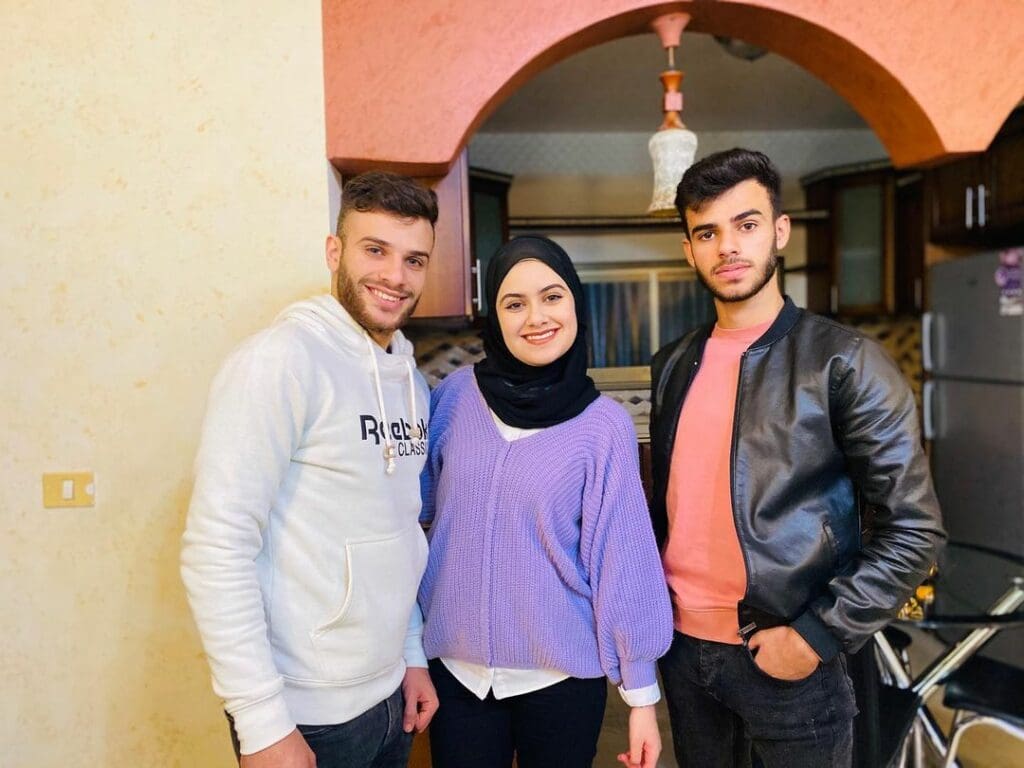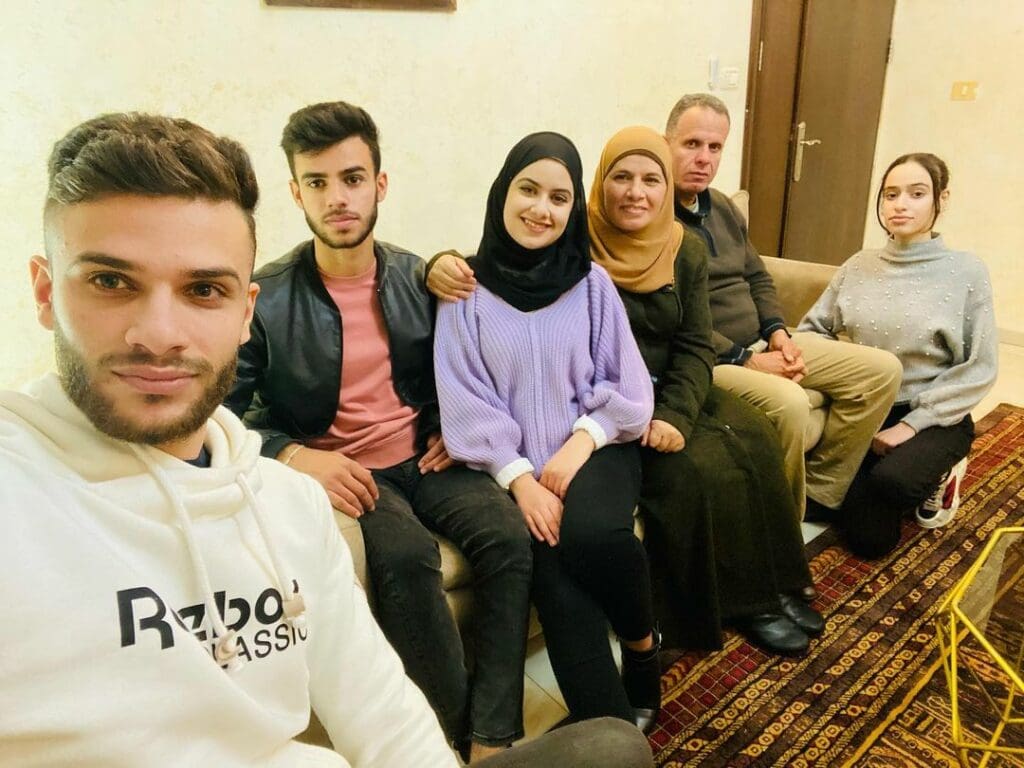
Ru’a Rimawi, a Palestinian doctor residing in Beit Rima, a village near Ramallah in the Israeli-occupied West Bank, carries the weight of November with a heart burdened by the painful recollection of losing both of her brothers in 2022. Jawad, at 22, and Thafer, just 19, had dreams and aspirations that were abruptly silenced by the actions of those in uniform.
The Israeli forces killed both on November 29, 2022.
Their story is a heartbeat among many in the West Bank, where families silently shoulder the repercussions of the 75 years of Israeli occupation.
To be Palestinian is to endure countless nights of military invasions, with the jarring sound of bombs pounding front doors and the chilling sight of rifles pointed directly at your face upon waking. While the world’s attention is riveted on the genocide in Gaza, families in the Israeli-occupied West Bank silently nurse wounds that are far from healed.
Recounting the events of that day, she said that it was 5 am and Ru’a was asleep in her room when the incident took place. As part of a military operation, the Israeli forces raided Kafr Ein, a Palestinian village that is 10 minutes away from her home, and she said that “Jawad and Thafer were among those who rushed to ‘defend’ their neighbours”.
She told Maktoob that her brothers had nothing in their possession except rocks to fight.
Thafer was shot in the chest when he threw a rock towards the convoy of armoured military jeeps. “Seeing his brother injured, Jawad ran to help him and while he was trying to drag his brother off the street, the military forces shot him in the stomach and pelvis,” she narrated.
Jawad was transported to a hospital in the nearby city of Salfit, but unfortunately, he succumbed to injuries on the way. Thafer, on the other hand, was taken to Ramallah and died shortly after arrival.
“Our priority was to keep him stable until we reached the hospital. But, amid this urgency, we faced an additional layer of concern — the possibility of encountering Israeli checkpoints on the road.”
“We had to weigh two grim possibilities. The first was the fear of deliberate obstruction, where we could be stopped intentionally, leaving him to bleed to death on the roadside. The second was equally distressing — being left to bleed to death ourselves, with the added cruelty of his body being detained, denying us the basic right to bury him and bid our final farewells,” she said.
Ru’a said she is still haunted by the terrifying memories of the Beit Rima massacre (2001). “The Israeli forces invaded my village, killing 15 Palestinians and wounding over a hundred others in what was retaliation for the assassination of Rehavam Ze’evi, the Israeli Minister of Tourism at the time,” she narrated.
“I can still hear the gunshots, explosions, and cries of 2-year-old Jawad. Fearing that our house would be bombed, our mother took us to our neighbour’s. To get there, we had to walk under the barrels of Israeli soldiers’ guns and move past snipers positioned above us.”
“My young hands trembled as I raised them in surrender, fearing that because I was short, the soldiers wouldn’t see them and shoot me. My mother carried Jawad, who was too young to walk,” she said.
‘I shielded Jawad from the violence that pervaded our lives”
Ru’a has been protecting her siblings since childhood. Jawad was just 5 years old when she witnessed the IOF arresting her father and blindfolding him in their living room.
“Jawad was just four at that time. He hid behind me and started crying. I shielded him from the violence that pervaded our lives, my small body the only buffer between him and an AK-47,” Ru’a said.
But this time she could not. Jawad and Thafer were among the five Palestinians who were killed that day. Ru’a said Jawad was a massive dreamer. He would tell her, “I don’t want to work in a company, I want to own one.” He worked at the Arab Islamic Bank.


“Thafer was one of the smartest people I have ever met. He had graduated high school with one of the highest scores in Palestine. He was a Computer Engineering student at Birzeit University who used to tell his mom, “I’m going to be successful, and I will travel the world with you.”
Jawad was killed before he could start his own company and Thafer never left the country.
“shoot-to-kill” policy
Mourners at the funeral of the two brothers noted that Israeli forces had never previously fired at Palestinians in that area; typically, arrests were made instead. The attendees expressed suspicion that these unprecedented shootings may be a result of “new orders,” signalling an alarming shift toward what they perceive as “state-sanctioned executions”.
Israel’s intensified raids in the occupied West Bank have led to a surge in Palestinian casualties, notably in Jenin and Nablus, over the past few years. The escalation, often justified by Israeli forces as efforts to suppress limited Palestinian armed resistance reflects a concerning increase in nightly operations.
Activist and author Robert Fantina emphasized that the “shoot-to-kill” policy is not new and has been a longstanding practice, describing it as barbaric. According to Fantina, this policy has seen a notable uptick following the victory of a coalition, including far-right politicians, in the November 2022 legislative elections.
On the same day, Israeli soldiers shot and wounded Raed Naasan in the chest and stomach as he sought refuge behind a building in his village, Al Mughayyir. Despite the Israeli military’s claim of a “violent riot” involving suspects throwing cinder blocks and Molotov cocktails at IDF forces, new video evidence contradicted this assertion, revealing that neither Naasan nor those around him were engaged in such activities.
In response to Naasan’s killing, the Israeli human rights group B’Tselem later commented that there are numerous instances of protests where Palestinians use rocks and stones, and sometimes other means, while Israel’s army consistently employs disproportionate force in these situations.
Under international law, the deployment of firearms by security forces against civilians is designated as a measure of last resort, permissible only when there is an immediate threat of death or serious injury. Despite these legal standards, Israel has been accused of flagrantly violating these principles, particularly in incidents involving the use of lethal force against civilians.
One year after the tragic day that altered her world, Raed’s mother Fatma, with her hands tightly clutching a worn photograph of her son, said: “No mother should bury her child, and no mother should have to fight for the truth about how he was taken away from her.”
The promises of internal investigations by Israeli forces echo hollowly, failing to bridge the chasm between their assurances and the reality of our suffering, she said. “They claim internal investigations, but where is the justice for my Raed? A mother’s heart knows no peace until the truth is revealed and justice is served.”
“I stand firm in the face of the Israeli military’s narrative, a narrative that distorts the truth of that tragic day. The video evidence, a painful testament to the injustice my family endures, contradicts their claims of a “violent riot” with Molotov cocktails. Raed sought refuge, not violence, behind that building, yet his life was taken away.”
The deliberate discrimination against Palestinians is deeply embedded in legal and policy frameworks, creating an environment that sustains their marginalized status. This discrimination has recently manifested in a surge of violence against Palestinians, with explicit support from the Israeli state. The rising violence in the occupied West Bank is a direct result of the systemic discrimination that has been allowed to persist.
Ethnic cleansing in West Bank
Israeli army and settlers have killed at least 247 Palestinians in the occupied West Bank and East Jerusalem since 7 October, which is more than the total death toll in 2022, according to the reports of the Palestinian Ministry of Health and UN Humanitarian Affairs Office (OCHA).
On November 9, Israeli forces conducted a second bombing of the Jenin refugee camp, utilizing heavy artillery and airstrikes, resulting in the tragic deaths of at least 14 Palestinians. This has also led to the forced displacement of various pastoralist and Bedouin communities in the Jordan Valley and south of the Hebron Hills.
In the heart of the West Bank, tensions are reaching a boiling point as Israeli forces ramp up their presence in what seems like an attempt to suppress a resilient resistance that senses a looming strike. The struggles are most palpable in Jenin and Balata, where the community’s steadfastness has managed to repel relentless incursions.
Settler violence has surged, doubling from an average of three incidents to an alarming seven each day.
Amid this chaos, the West Bank echoes with collective frustration. Mass strikes and protests resonate across cities, condemning what many perceive as the Palestinian Authority’s complacency and vehemently denouncing Israel’s actions in Gaza.
Villages bear the brunt of settler violence — olive trees are torched, homes set ablaze, and innocent Palestinians face unspeakable violence. The demolition of homes, airstrikes, and the besiegement of those affiliated with the resistance intensified, leaving communities living in constant fear.
Adding to the distress is a surge in mass arrests and abductions, a form of collective punishment against Palestinians, particularly in the West Bank. The Palestinian Prisoners Club recently reported that the number of detainees has now surpassed 3,000 since October 7, with many held in administrative detention without charge.
Amid the turmoil, the justice system itself faces scrutiny. Families and lawyers are denied visits to prisoners, and six inmates have reportedly lost their lives. Accusations of Israel using the justice system as a “revenge policy” weigh heavily on the minds of those affected.
In the aftermath of a four-day truce in Gaza, the West Bank continues to bear the brunt of violence. Over seven weeks, Israeli attacks have claimed the lives of nearly 15,000 Palestinians in Gaza and over 230 in the West Bank, leaving wounds that extend far beyond the physical realm.
Every avenue of escape, every entrance and exit to cities, is barricaded, fortified by additional barriers and imposing cement cubes that render movement between them a nearly insurmountable challenge. The very essence of connection and freedom is stifled as some cities find themselves severed from the villages that surround them.
In the occupied territories, the weight of this oppressive control is felt acutely. Israeli forces, in a show of added dominance, have installed three additional checkpoints at the northern entrance. These checkpoints operate erratically, opening and closing without warning, plunging Palestinian families into uncertainty about when they can travel. The checkpoints, rather than serving as security measures, have effectively transformed into tools of coercion, leaving residents feeling like hostages within the confines of their own homes.
As families battle with the unpredictability of these new obstacles, the very essence of normalcy is eroded.
“Every day, I wake up expecting to see his face, and then reality hits. I see his empty room, his belongings, and it’s just so… (Pauses, struggling to find words) …unbearable,” Raed’s mother sighed.
“Their memory will not fade. We will continue to speak their names, share their stories, and ensure the world knows the impact of their lives.”
Ru’a poured her emotions, remembering her brothers: “I know mere words won’t bring Jawad and Dhafer back or ease this pain. Still, I persist in speaking because I believe in the power of words, in the existence of goodness.”
“Discussing them, immortalizing their memory, is my form of resistance. It’s unjust for them to be erased from history. This pain shouldn’t be repeated — no sister should lose two brothers, no mother should bury her children in a single day.”
Kasturi Chakraborty, an Indian journalist, specializes in covering Palestine. With roles at various international publications, her expertise extends to politics, international relations, foreign policy, and the dynamics of war and conflict. Additionally, she has served at the Embassy of Georgia.



